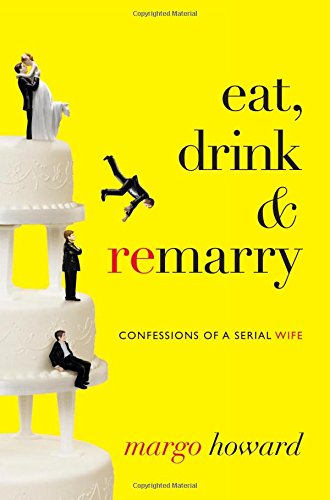 Author entitlement is a wonderful thing. Just by putting pen to paper, you can be forgiven for child abuse. Stalking. Abusing your readers. Grumpy-catting when you can’t get the recognition and validation you paid for. Especially in your own mind. Apparently it’s all part of that miraculous creative process.
Author entitlement is a wonderful thing. Just by putting pen to paper, you can be forgiven for child abuse. Stalking. Abusing your readers. Grumpy-catting when you can’t get the recognition and validation you paid for. Especially in your own mind. Apparently it’s all part of that miraculous creative process.
So welcome Margo Howard as today’s star turn in authorial over-self-entitlement. (Is that a word? Sorry, English language, but it sure is an accurate description.) Aided and abetted, as these cases so often are, by a paranoid conspiracy theory – which is given added credence and visibility, in this instance, because it happens to coincide with someone else’s equally unhinged views on that monstrous devourer of all that is good and bright in the world: Amazon.
(Bear in mind, by the way, that Franklin Foer’s New Republic article has been torn to pieces not just by the lunatic fringe self-publishing fanatics, but by the Washington Post, among others. And naturally it’s the New Republic that’s kind enough to give Howard her air time on this issue.)
In her article “Amazon’s Elite Reviewing Club Sabotaged My Book,” Howard claims that the Amazon Vine Community … well … sabotaged her book by conspiring to review it. Badly. Now if as Howard states, she never even heard of the Vine Community prior to this, it’s hard to know how it could have had such a grave impact on the fortunes of her book. And also, since the reviews she mentions were pre-publication, it’s equally hard to know how much its performance could have been impacted by those reviews, with no sudden post-review downwards lurch in the numbers of copies sold. But why let logic get in the way of a good tantrum?
Howard’s not afraid to say that: “I was so distressed about this injustice that I looked up the list of Amazon’s board of directors. Great good luck, I happened to know two of them, so I pestered the one who was a lawyer, feeling all this slamming by the barely literate approached tortious interference.” So hold on: She’s attempting to bring legal pressure to bear on the board of a major book distributor to get bad reviews of her book removed? What exactly is that called?
The Passive Voice, linking to Howard’s article, has picked up a crop of comments from actual Vine reviewers. And as one of the commentators points out, “the Vine reviews are paid for by the publisher.” Oh, and Howard also happens to know a couple of Amazon directors: How does that make her a likely victim of a conspiracy? Jennifer Weiner is not exactly sympathetic either, and seems to be joining a fast-consolidating movement to elect Margo Howard Fairy Queen of the Special Snowflakes Club by acclamation. Elsewhere, she’s already being bracketed with child porn consumption apologist (oops … bestselling author…) John Grisham and Kathleen Hale in “When Authors Go Off the Deep End.”
Seems like Howard has withered on the Vine. Thanks, New Republic, for helping share her problem so widely. Oh and incidentally, Franklin, she really helps validate your anti-Amazon case. Really really.

































I used to be a Vine reviewer and still have high reviewer ratings on Amazon, so I’ll give a bit of the background.
You get to be one by being a top-rated reviewer. Some do that by being helpful and honest. That was my goal. Some please others by gushing with excitement or dripping with criticism. Each lifts your review out of the ordinary.
As I understand it, that rating comes from reviewing any of Amazon’s products. That means there’s nothing about becoming a Vine reviewer that requires you to be a top ranked book reviewer. That matters.
The best benefit of being a Vine reviewer is the chance to get everything from pricey electronics to top-rated kitchen utensils for free. Nice! With only an occasional exception, however, those go very fast. You’ll need to spot that email coming in and immediately act on it. Some items are gone within a minute.
The worst items to review tend to be food samples. When I started, the samples were substantial enough to be worth the bother of a review. You might get enough breakfast bars, for instance, for a week of breakfasts. Over time, that faded away. Reviewing a breakfast bar might get one solitary bar, probably because the companies were objecting to the shipping costs. That was only attractive to someone who was broke and starving. I assume they gave very good reviews.
In between the $150 gadgets that went quickly and the 15 cent candy bars that almost no one wanted were books that were typically worth about $15. The nature of the demand is, I suspect, where the difficulty with Vine book reviews lies.
Books aren’t like gadgets. I never requested a digital gadget I had no use for. Valuable or not, setting it up to properly review took too long for something I didn’t need. That meant that, as long as the device did what it was supposed to do, I was predisposed to give it reviews where the pros outnumbered the cons.
That isn’t as true with books. Most people don’t get just any book. The review wouldn’t be worth the trouble. They get books they think they’ll either really like or really hate.
With me, histories and Nolo legal guides got good reviews. I liked the first because I like history and I liked the second as useful references. I can see three of the latter on my bookshelves now. They were worth shipping cross-country when I moved.
But I also got books that I knew before ordering that I’d dislike. Most, I must say, did not stand a chance. I drew alongside them and leveled broadside after broadside until they sank beneath the waves. I’m sure the authors weren’t happy, particularly given that Vine reviewer label I had, but that’s life. You have to take your lumps. I did read the books and I did try not to treat anything they said unfairly.
And, however these authors may have felt, I felt they deserved what I said. I never regarded being a Vine reviewer as being paid to give only good reviews. My readers got the truth.
This woman’s book may be as awful as those reviewers and others are saying, or she may have just hit on back luck, getting an ill-tempered reviewers inclined to blast away. Again, that’s life. Her vendetta against Amazon has now gotten her book more attention than perhaps 999 out of 1000 books get, so she now has more chance at success than most authors get.
For that she should be happy. The rest she should just forget and move on.